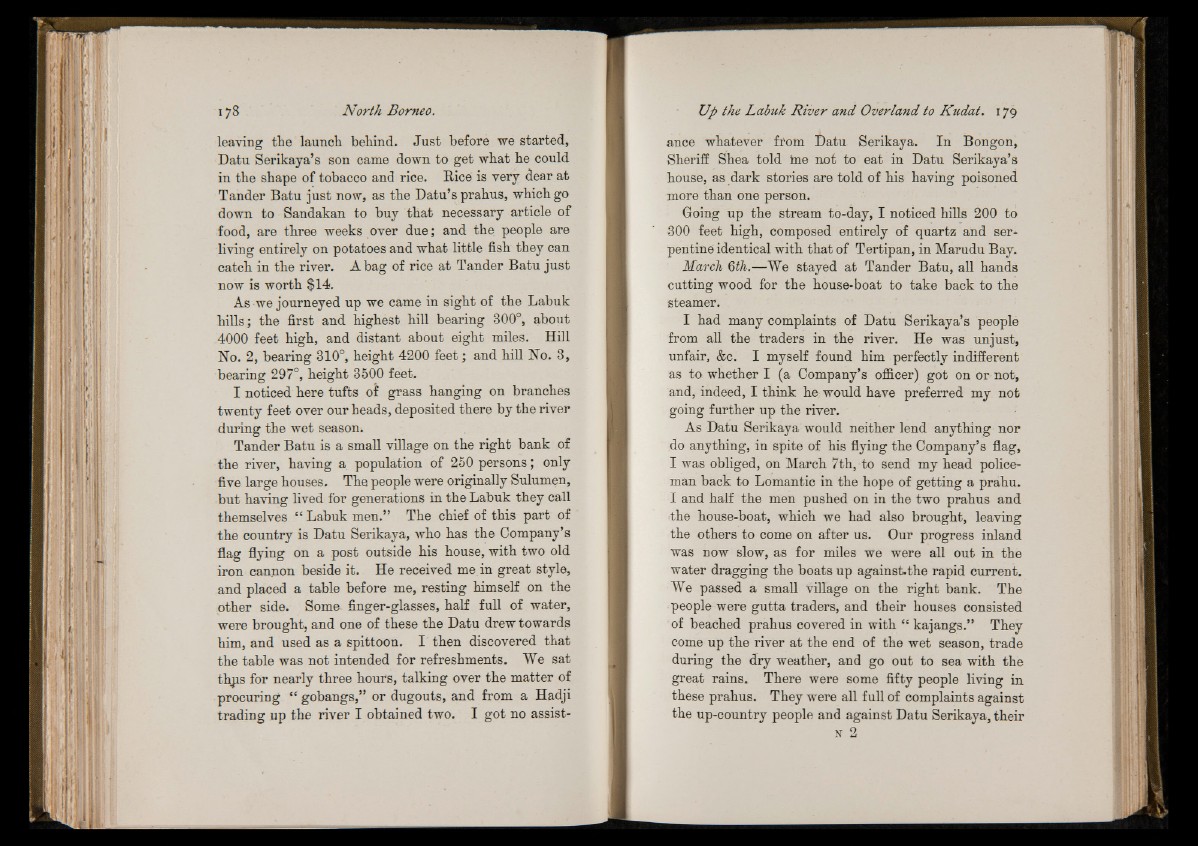
leaving the launch behind. Ju st beforè we started,
Datu Serikaya’s son came down to get what he could
in the shape of tobacco and rice. Rice is very dear at
Tander Batu just now, as the Datu’s prahus, which go
down to Sandakan to buy that necessary article of
food, are three weeks over due; and the people are
living entirely on potatoes and what little fish they can
catch in the river. A bag of rice at Tander Batu just
now is worth $14.
As we journeyed up we came in sight of the Labuk
hills ; the first and highest hill bearing 300°, about
4000 feet high, and distant about eight miles. Hill
No. 2, bearing 310°, height 4200 feet ; and hill No. 3,
bearing 297°, height 3500 feet.
I noticed here tufts of grass hanging on branches
twenty feet over our heads, deposited there by the river
during the wet season.
Tander Batu is a small village on the right bank of
the river, having a population of 250 persons ; only
five large houses. The people were originally Sulumen,
but having lived for generations in the Labuk they call
themselves “ Labuk men.” The chief of this part of
the country is Datu Serikaya, who has the Company’s
flag flying on a post outside his house, with two old
iron cannon beside it. He received me in great style,
and placed a table before me, resting himself on the
other side. Some finger-glasses, half full of water,
were brought, and one of these the Datu drew towards
him, and used as a spittoon. I then discovered that
the table was not intended for refreshments. We sat
thps for nearly three hours, talking over the matter of
procuring “ gobangs,” or dugouts, and from a Hadji
trading up the river I obtained two. I got no assistance
whatever from Datu Serikaya. In Bongon,
Sheriff Shea told ine not to eat in Datu Serikaya’s
house, as dark stories are told of his having poisoned
more than one person.
Going up the stream to-day, I noticed hills 200 to
300 feet high, composed entirely of quartz and serpentine
identical with that of Tertipan, in Marudu Bay.
March 6th.—We stayed at Tander Batu, all hands
cutting wood for the house-boat to take back to the
steamer.
I had many complaints of Datu Serikaya’s people
from all the traders in the river. He was unjust,
unfair, &c. I myself found him perfectly indifferent
as to whether I (a Company’s officer) got on or not,
and, indeed, I think he would have preferred my not
going further up the river.
As Datu Serikaya would neither lend anything nor
do anything, in spite of his flying the Company’s flag,
I was obliged, on March 7th, to send my head policeman
back to Lomantic in the hope of getting a prahu.
I and half the men pushed on in the two prahus and
the house-boat, which we had also brought, leaving
the others to come on after us. Our progress inland
was now slow, as for miles we were all out in the
water dragging the boats up against.the rapid current.
We passed a small village on the right bank. The
people were gutta traders, and their houses consisted
of beached prahus covered in with “ kajangs.” They
come up the river at the end of the wet season, trade
during the dry weather, and go out to sea with the
great rains. There were some fifty people living in
these prahus. They were all full of complaints against
the up-country people and against Datu Serikaya, their
n 2